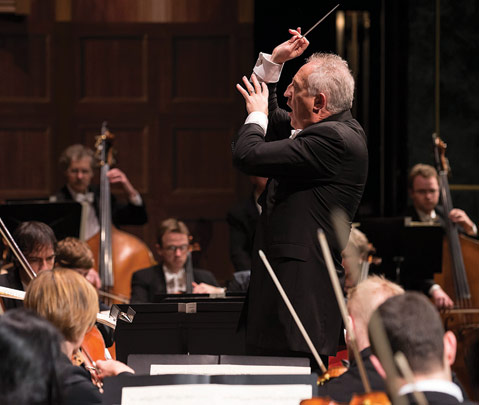Vancouver Symphony Orchestra at the Granada Theatre
Grieg and Prokofiev, with Encores by Brahms and Elfman

The first CAMA concert of 2013 was a crowd-pleaser, with Bramwell Tovey’s dynamic and hard-charging Vancouver Symphony Orchestra (VSO) beautifully complemented on Edvard Grieg’s Piano Concerto in A Minor, Op. 16, by soloist Jon Kimura Parker and stunning on its own in the Symphony No. 5 of Sergei Prokofiev. Things got off to a charming start with Tovey, who can captivate an audience without even raising his baton, who took his time introducing the program. He spoke exceedingly well about the music, leavening his observations with deft and self-aware witticisms. However, despite the maestro’s best efforts to create interest in the opener, it remained relatively undistinguished. The three-part piece called Totem by VSO composer-in-residence Edward Top reaffirmed the sense of cacophonous predictability that keeps newer compositions segregated to the margins of contemporary orchestral programs.
From there, though, the going was much better, as the wonderfully familiar first notes of the Grieg concerto reverberated through the hall. Parker brought a playful, imaginative quality to this workhorse of the repertoire, and he and the orchestra combined to plumb the depths of Grieg’s connections to Beethoven without sacrificing any of his Mozart-like sweetness. The dynamics were excellent, and, when time came for the most delicate notes in the third movement, the audience was entirely rapt. In response to a standing ovation, Parker returned for a brilliant solo encore — Danny Elfman’s The Simpsons Theme. When’s the last time you heard that one played live by a first-rate classical pianist?
After the intermission, the orchestra dove into the sprawling, moody grandeur of the Symphony No. 5 in B-flat Major, Op. 100, of Sergei Prokofiev. This truly great work was written in the Soviet Union during the last year of World War II, and it has the heft and sophistication to lay claim to a very high place in the pantheon of 20th-century symphonies. Dark, massive, and clever, Prokofiev’s fifth compares favorably with those other well-known fifths by Beethoven and Shostakovich. The orchestra remained impressively well synchronized, even in the passages where all hell breaks loose, and the individual soloists, in particular the clarinet and the horn, were outstanding. Percussion also plays a major role in this piece, and the various members of this section each did their job with subtlety and restraint.
The perennial question of how to understand a work that was completed by an artist who suffered under the reign of Joseph Stalin is very nearly thrust aside by the opening movement of this symphony, which is perhaps too bracing and lyrical to be corralled by either an accommodationist or a secretly critical bias. Although it is difficult to trust fully the seemingly propagandistic remarks Prokofiev made about this work when it premiered in 1945, there can be no question, hearing it again today, that there is a great optimism being expressed, albeit through the lens of a life stunted and subdued by the heavy weight of Russian politics. The Vancouver Symphony Orchestra under Tovey is one of the world’s most musical orchestras, capable of playing this particular brand of Russian optimism for all it’s worth.



